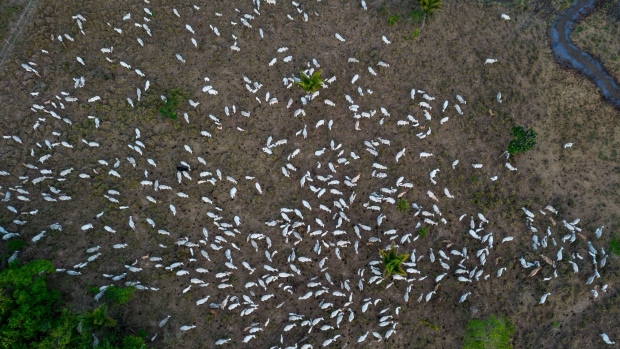Feb 23, 2022
Big Beef Loan Shelved Amid Uproar Over Amazon Deforestation
, Bloomberg News

(Bloomberg) -- Plans for a $200 million loan for Marfrig Global Foods SA have fallen apart amid growing concern that Brazil’s second-biggest beef producer is fueling deforestation in the Amazon.
The Inter-American Development Bank’s private-sector arm shelved its plan to lead the syndicated loan after a series of setbacks. First, a vote on the financing was pushed from December to May, according to two people familiar with the matter. The bank couldn’t agree with the company on environmental targets, as well as the financial terms of the loan, said one of the people. Now, the loan is inactive, according to IDB’s website, and is no longer go up for a vote.
With Amazon deforestation at a 15-year high, Brazilian meatpackers like Marfrig and its biggest rival, JBS SA, are increasingly coming under fire for their role in the destruction of the world’s biggest rainforest. More than 70% of deforested land in the Amazon turns into pasture that’s used by cattle ranchers for grazing animals.
Activist groups including Friends of the Earth started pressuring the bank last year, and alleged that the IDB credit line would violate the bank’s sustainability policies. Their key argument: Marfrig hasn’t followed through on a decade-old vow to track its full supply chain, and can’t pinpoint the origin ranches for much of the cattle it buys in Brazil’s Amazon.
Read more: How Big Beef Is Fueling the Amazon’s Destruction
The loan, in which $43 million would have come from IDB Invest and $157 million would have been syndicated, was announced in April 2021 to fund Marfrig’s Plano Verde+, or Green+ Plan, aimed at strengthening the sustainability of its beef supply chain.
Marfrig in an email confirmed that the loan is no longer under consideration and didn’t comment further. The IDB said by email that it “came to the mutual agreement that the conditions were not ideal to move forward with the loan” after carrying out in-depth due diligence of Verde+.
“We hope the IDB Invest’s decision to drop the Marfrig loan sends a signal to other banks,” said Kari Hamerschlag, deputy director of food and agriculture at Friends of the Earth U.S. “Public development banks cannot keep funding industrial livestock operations like Marfrig, which drive the climate crisis with deforestation, biodiversity loss and methane emissions in Brazil and globally.”
©2022 Bloomberg L.P.


